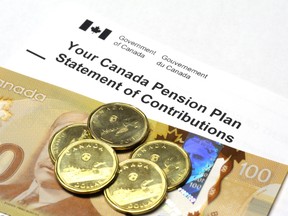In their current form, both the CPP and EI rely heavily on contributions from Albertans. Alberta’s withdrawal would necessitate fundamental changes to these programs…
Article content
As the Alberta Next Panel — tasked with advising the Smith government on how the province can better protect its interests and defend its economy — prepares to reconvene on Aug. 14, one thing is clear: many Albertans feel they’re treated unfairly in the federation. But if the rest of Canada understands and responds to Albertans’ concerns, it could lead to a stronger Canada for everyone.
Advertisement 2
Article content
Under the current system of fiscal federalism, Ottawa collects taxes then redistributes money to the provinces and/or individual Canadians through programs including equalization, the Canada Pension Plan (CPP) and employment insurance (EI). Albertans make outsized contributions to these programs because the province has a relatively young population, fewer retirees, higher incomes and higher employment rates.
Article content
Recommended Videos
Article content
Fuel from Alberta
For perspective, from 2007 to 2022, Albertans’ net contribution to federal finances (total federal taxes paid by Albertans minus federal money spent or transferred to Albertans) was $244.6 billion — more than five times the net contribution from British Columbians or Ontarians (the only other two net contributors).
Article content
Advertisement 3
Article content
Consider Alberta’s role in the equalization program, which redistributes money to theoretically ensure each province can provide comparable levels of public services at comparable tax levels. In 2023, the federal government spent $24 billion, including an estimated $3.3 billion from Alberta, which has not received equalization payments since 1964-65.
Article content
Albertans also disproportionately contribute to the CPP. From 1981 to 2022, the amount Albertans paid into the program — over and above what retirees in Alberta received in CPP payments — was $53.6 billion. That’s approximately six times greater than the net contribution of B.C., the only other net contributing province. Put differently, residents in seven out of the nine provinces that participate in the CPP (Quebec has its own plan) receive more in benefits than they contribute to the program. And from 1981 to 2023, Alberta workers contributed $23.9 billion more to Canada’s EI program than Albertans received back in EI benefits. (Ontario was the only province to make a larger net contributor to the program.)
Advertisement 4
Article content

In their current form, both the CPP and EI rely heavily on contributions from Albertans. Alberta’s withdrawal would necessitate fundamental changes to these programs, including higher contribution rates (i.e. taxes) and potentially reduced benefits for Canadians in other provinces.
Clearly, Albertans make an outsized contribution to the federation — but that, in itself, isn’t the issue. Here’s the problem — at the same time, federal policies disproportionately and negatively impact the province, including Bill C-69 (the ‘No Pipelines Act,’ which imposes onerous review requirements on major energy projects including pipelines), an oil tanker ban limiting energy exports to Asian markets off B.C.’s northern coast, an arbitrary cap on oil and gas emissions that will require production cuts while most of our international peers ramp up production, numerous net-zero policies, and so on.
Advertisement 5
Article content
Policies hit province hard
These policies prevent Alberta from reaching its full economic potential. According to estimates from a 2024 Deloitte report commissioned by the Alberta government, due to the federal emissions cap, Alberta’s economy (GDP, inflation-adjusted) will be $191 billion smaller from 2030 to 2040, and result in lower wages, job losses and a decline in tax revenue. Ironically, this also means less revenues for Ottawa. The same report estimates the emissions cap will shrink Canada’s economy by more than $280 billion over the same 10-year period. In other words, these federal policies have consequences for not only Albertans but all Canadians.
Read More
The Alberta Next Panel presents an opportunity. If Canadians outside Alberta can better understand the province’s important role in the federation, it could lead to undoing the damaging federal policies that limit Alberta’s energy sector, which would ultimately benefit Canadians across the country.
Tegan Hill is director of Alberta policy and Nathaniel Li is a senior economist with the Fraser Institute.
Article content

